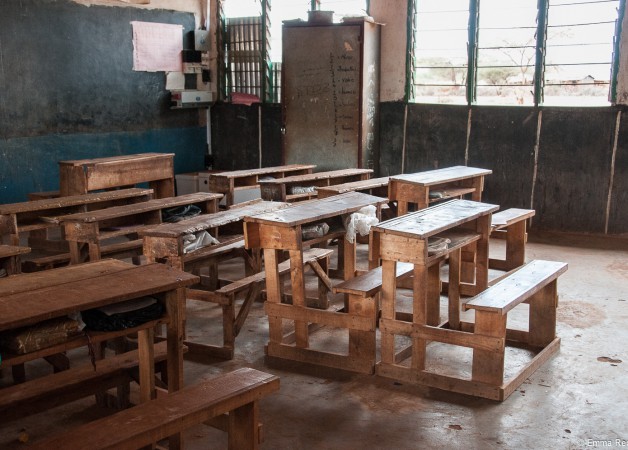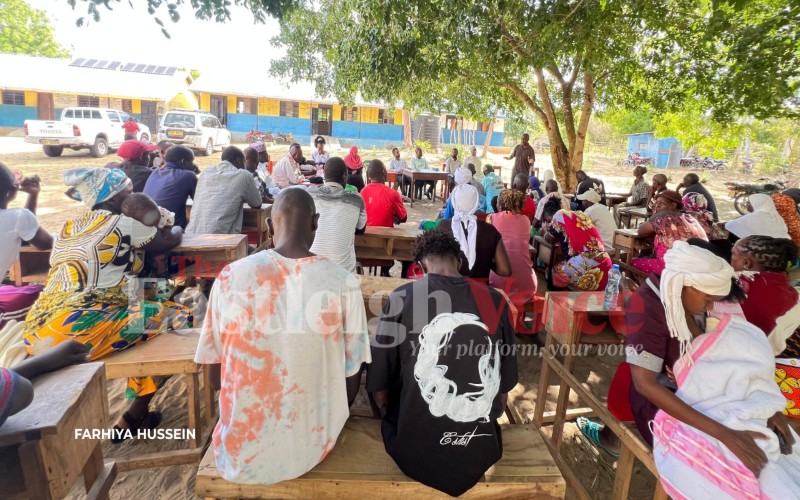Beyond stereotypes: Inside Mandera County's relentless fight against terrorism
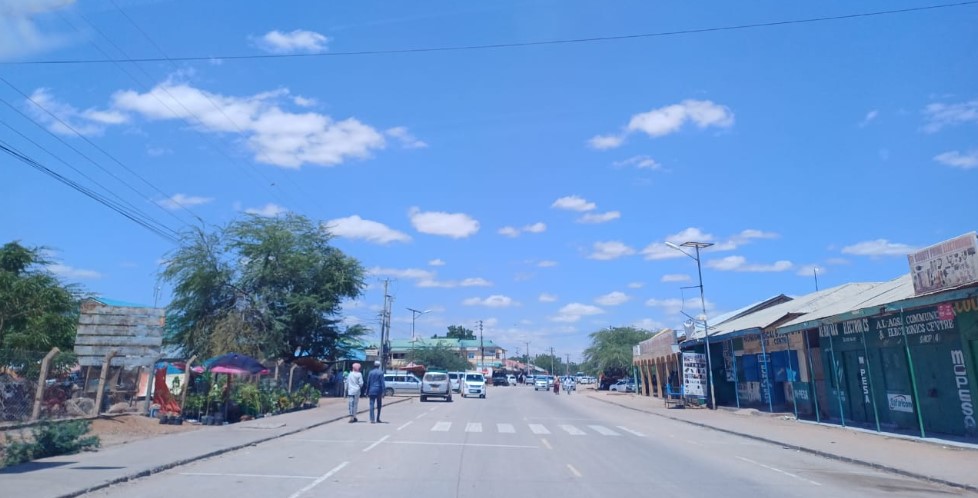
The number of idle school-going children has reduced and as more developments are established courtesy of devolution.
Despite ranking amongst counties with the lowest crime rates in the country, Mandera County has for years suffered the brunt of some of the worst terror attacks, making it a dreaded deployment zone in the north eastern region.
The dynamic is changing, but few seem to notice. This is because the attacks have reduced in size and frequency, courtesy of ongoing security operations, coupled with ongoing efforts to foster peace, reduce illiteracy levels and improve the economic status of the communities.
More To Read
- Mandera County Commissioner assures residents of security ahead of Banisa by-election
- Mandera launches emergency food aid for 15,000 amid deepening drought
- Over 170,000 livestock targeted as Mandera and Garissa ramp up vaccination drives
- Mandera residents challenge gazette-only notices in landmark land case
- Djibouti to deploy more troops to Somalia to counter Al-Shabaab threat
- Somali intelligence kills Al-Shabaab leader Abdi Xiiray in major crackdown
Today, the county is experiencing some prevailing peace. A walk or drive around Mandera town shows the heavy presence of security officers from the National Police Reservists, the National Police Service and the military that is responsible for the only airstrip in the county.
At the same time, the number of idle school-going children has reduced and as more developments are established courtesy of devolution, a good number has gotten into employment.
"For us, we can't say security is a national government function. It is the responsibility of every citizen of this country because if you look at the population of police officers, you understand what I mean. The police can also not be everywhere, so we take security as our responsibility," Mandera Governor Mohamed Adan Khalif said in an interview.
Consequently, internal efforts to improve literacy, a situation that has for a long time been worsened by a high poverty index coupled with a sour relationship between the locals and security agencies, have seen the previous bad situation improve.
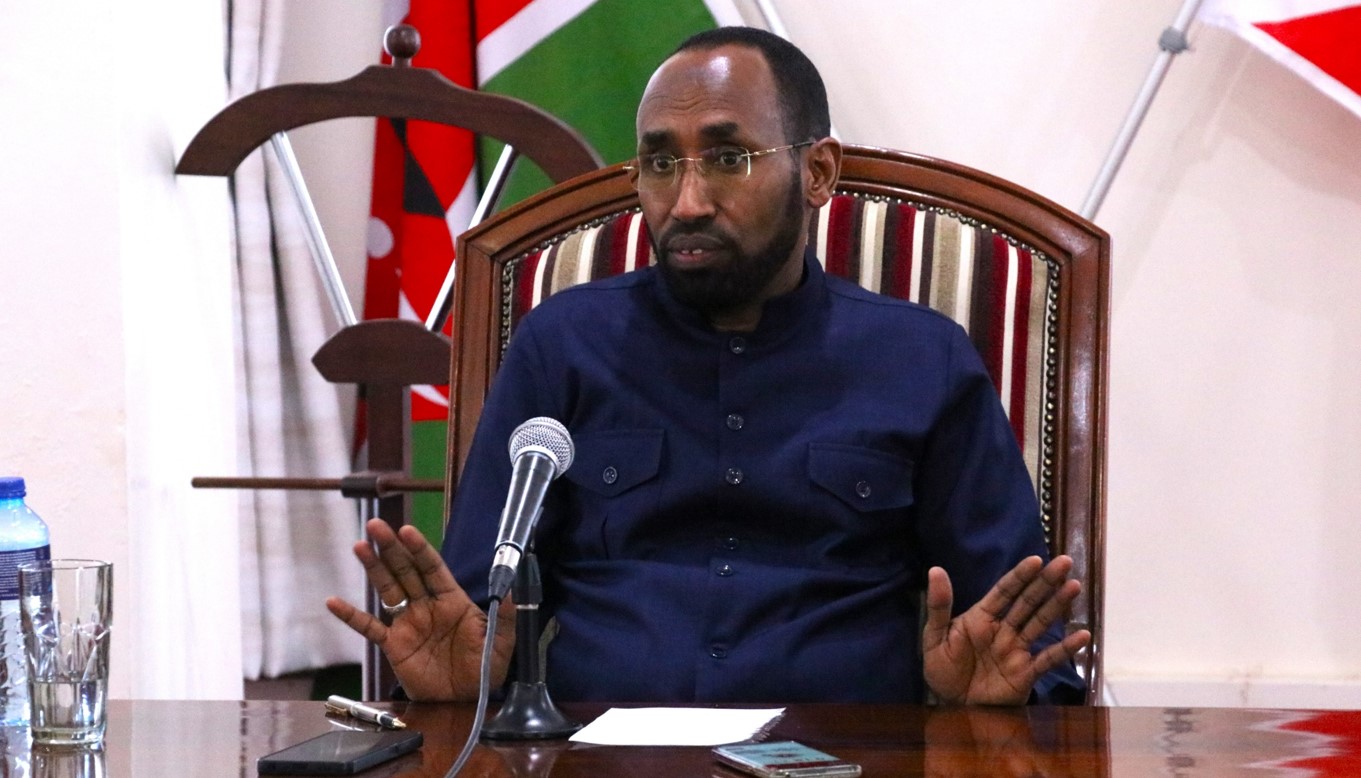 Mandera Governor Mohamed Adan Khalif. (Photo: Mary Wambui)
Mandera Governor Mohamed Adan Khalif. (Photo: Mary Wambui)
Security agencies say the terror attacks happening today are opportunistic and sporadic small-scale incidents with particular targets and, sometimes, caused by business rivalry.
"There are no areas where Al-Shabaab has taken over, all the areas are manned by government officers. However, sporadic attacks happen once in a while; in fact, crime rate here is very low compared to other parts of the country," Mandera East Deputy County Commissioner Patrick Meso said.
In the past, a series of attacks saw the county lose a majority of its TSC-employed teachers who sought transfers to other areas citing security concerns.
Back to the drawing board
This dealt a major blow to efforts by the county to improve literacy levels and set the local leaders back to the drawing board.
The leaders felt that by killing government officers working in Mandera, Al-Shabaab insurgents were derailing development in the county.
"By targeting teachers whom they call non-locals, they are killing the education sector. Targeting security personnel is also the same thing. So, people have realised this and the moment they get information on Al-Shabaab passing anywhere in this county they share it; even someone in the bush will call and say ‘I have seen them passing’, but the biggest challenge is response. We would have done better if there was a quick response to the information that is being shared by the public," said the governor.
The majority of the teachers were, however, found not to be genuine. An internal probe into their massive withdrawal revealed that the majority would use Mandera as a launch pad for their teaching careers.
"What normally happens is when they are coming here they want to get a job but once they get the TSC letter, a small thing happens and they magnify it, go to the press and say they want to go back to their homes," Meso explained.
Many, however, are still teaching in most private schools and ECDE centres, earning better than their colleagues elsewhere. An ECDE teacher in the county earns Sh30,000 monthly and some of those who left are reported to have regretted their moves when their hardship allowances were slashed from their pay slips.
The schools filled the gaps left by employing more BoM teachers.
The county government also kicked off the training of local teachers at Mandera Teachers Training College, where the first cohort has completed its first year of study.
"We've always complained of being left behind since independence. If you look at illiteracy levels, Mandera was among the areas where the population is almost 70 per cent illiterate. Despite the challenge of the teachers, people have now realised the need to take their children to school because pastoralism is no longer sustainable," noted the governor.
 Mandera East Deputy County Commissioner Patrick Meso. (Photo: Mary Wambui)
Mandera East Deputy County Commissioner Patrick Meso. (Photo: Mary Wambui)
School enrolment
The county also realised that increasing enrolment in primary schools was bound to bring challenges if secondary education is not guaranteed, as many parents were unable to cater to their children's fees.
"We realised that leaving those children after completing primary school is going to be a security challenge for us because with that huge number of dropouts then you can imagine what will happen next; people will join radical groups," he added.
Today, under the Elimu Kwa Wote programme, learning in elementary and secondary schools has become free in Mandera County, and those who seek training at the local colleges get half of their fee paid by the county government.
Additionally, those graduating from the vocational training centre graduate with a set of their respective courses' work kits to help them start self-employment.
These joint efforts are credited for the lingering peace in the county that, though surrounded by two neighbours — Ethiopia and Somalia — which are currently in simmering conflict, the governor feels the county is stable enough to absorb the resultant shocks in the event it spills over to them.
"I am not competent to talk about a dispute at that level, but I do not think so. Normally, if there is an attack in a neighbouring country, it affects us in many ways, e.g., it affects cross-border trade but we do not expect it to escalate that much," he said.
The journey to the prevailing peace has, however, been long and winding going by the past relationship between the local communities and security agencies.
"There's a bad history in northern Kenya between the local population and the security organisations of this country. We had the Wagalla massacre, Garissa massacre and so many others. That is why we opposed the KDF entry to Somalia, because we knew once they got there we were going to have retaliation from Somalia and the population of northern Kenya would be the victims. Somehow it happened at the beginning but later we sat and engaged the security council. There are criminals and there are citizens who are just going about their business. They came to realise that by closely working with the population, the security of this area will improve, it worked for us," the governor said.
Today, the relationship between the local communities and the security agencies has improved.
"We talk to the communities and tell them that Al-Shabaab is not only looking for non-residents, uniformed officers and Christians, a narrative they sell yet it is not true. They pretend they do not kill people who believe in Islam which is not true. We have lost people and you see what happened in Mogadishu, they kill everybody. The narrative keeps on changing," the governor said.
Security agencies, however, believe though there's lingering peace, Al-Shabaab informers (both locals and non-locals) are still living amongst the communities.
"Not everyone in Mandera is bad but we have those that have been recruited into the intelligence wing of the Al-Shabaab which we call Amniyat. Some of them are even our own non-local people, for your information, you will find them collecting intelligence and giving it out to the militia,” Meso said.
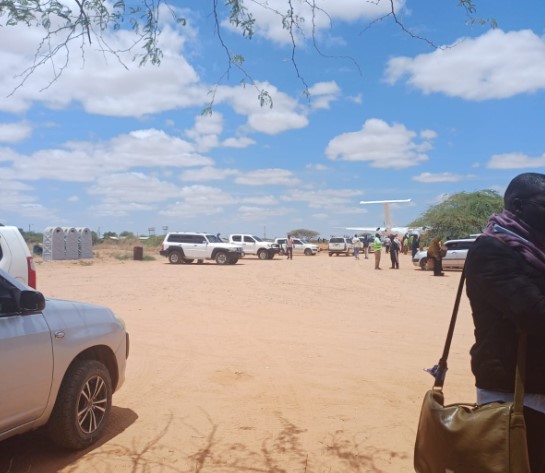 A view of the Mandera Airstrip. (Photo: Handout)
A view of the Mandera Airstrip. (Photo: Handout)
The intelligence wing of the terror group is also said to have recruited women, some unknowingly and harmless but could be actively sharing information that could harm those targeted by the group.
"Remember the people who come to hit you are not the people who you are eating with but the person who betrays you must be very close to you, could be your relative or your best friend who is profiling you, giving out information, your movements, routine etc. you may never notice," he said.
Investigations into the July 24 attack at Fish Point Hotel revealed that the incident that left five injured, including three police officers, was facilitated by an informer and was targeting three police officers who had an earlier altercation with some taxi drivers.
"The person who dropped them at the eatery informed the executor that he had delivered them. After they sat and ordered meals, the IED detonated, and other clients suffered collateral damage. In this case, it was not a non-local that was being targeted but the police officers," said Meso.
The incident, one of many that have targeted police officers frequenting eateries owned by non-locals or the eateries themselves, prompted an order by security agencies for the closure of all eateries operated by non-locals.
A local who has been under arrest in Somalia is also reported to have teamed up with some militia to ambush and kill a government driver last month, before hijacking the government vehicle and driving off to Somalia.
The tragedy of non-locals
For a long time, the notion has been that non-locals, otherwise referred to as the 7th tribe in Mandera, are the sole targets of terror attacks, but the issue is complex. It emerged that some locals also predispose themselves to conflicts.
Mandera has an estimated 400 and 600 non-locals working in the quarries, hotels, and other establishments. They come from Kitui, Meru, and Nyeri and are all working across the formal and informal sectors in the county, including at the quarries.
Security agencies say they have tried to enlighten them on ways they can avoid being soft targets but some remain adamant.
Those working in quarries are told to only work during the day and stay indoors at night but some will do the opposite
"You see, you can remove somebody from the community but you cannot remove the community from somebody," the DCC said.
High-risk area
Other non-locals will want to gather, prepare traditional brews, play loud music, dance at night and become vulnerable, forgetting this is a high-risk area.
"As you know Al-Shabaab will want to get mileage when they kill 10 people, they will be very happy and publicise it. We have tried to advise them not to be staying together but, you see, they rent a whole building where 100 of them stay making themselves a soft target," he explained, adding that their mode of dressing also fails to assimilate with that of the locals.
"Some of our people here wear mini-skirts which are against the beliefs of the locals. That is why the hatred keeps on increasing with them getting perceived as promoting immorality. You find some women getting drunk and misbehaving, walking in bikers to the shops which is an abomination to the Muslim community," he added.
Meso said security agencies have, however, tried talking to landlords to assist in securing the non-locals residing in their premises and where challenges occur, they respond promptly by deploying armed National Police Reservists (NPR).
The NPRs play a critical role in securing hotels that host visiting dignitaries including state officials and humanitarian agencies’ workers on assignment in the area.
"Here, as the police, we work very closely with NPR, who assist us in maintaining security in this town. They are supported by the county government and we appreciate that," said Meso.
The county administration collaborates with NPR in maintaining the security of the town as other national government security agencies tighten their operations along the border.
"As a county, we are supporting them in terms of logistics. In Mandera town, we have about 11 cars which are used purposely for patrolling the area. In some cases, we also give them some financial support," said the governor.
Cross-border meetings
Other interventions by the area leaders and security teams have led to regular cross-border meetings between Kenyan security officials and their counterparts in Somalia and Ethiopia.
"We have a very good relationship with both sides. The only thing that remains now is Al-Shabaab whose attacks are now minimal in size and far apart. It's not close to what it used to be. Their acts now are in small bits," Mandera Deputy Governor Ali Maalim Mahamud said.
At the same time, the county government has established a Department of Community Cohesion and Conflict Management that primarily addresses emerging internal issues and prevents them from escalating and becoming an avenue that Al-Shabaab can take advantage of to expand its scope of activities.
The department is localised into committees that handle disputes over resources like water at the source and extends its mandate to cross-border engagements in the event of cross-border conflicts.
Today, Mandera is arguably a fast-developing town that could rival some cities in a few years when road connectivity and airstrip are expanded to allow faster and easier movement of investors, labour and goods to and from the region.
The deputy governor noted that when people think of Mandera, they think of someplace that is very far yet it is the most strategic location for investment because it is the gateway to the Horn of Africa.
"It is actually a regional hub because, as we sit, Mogadishu is 500km from here, Nairobi is 1,000km, Addis is 1,000 km, the port of Berbera in Somaliland is 1,000km, Djibouti is close to 1,000 km, so you can imagine how much economic activity has been lost by closing this corridor," he said.
Top Stories Today








